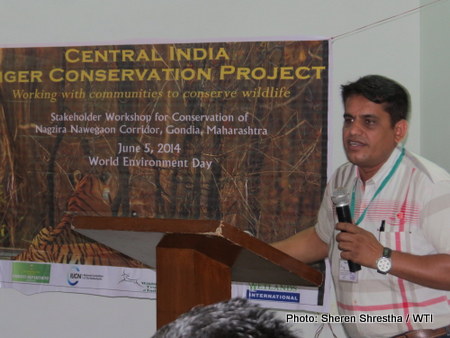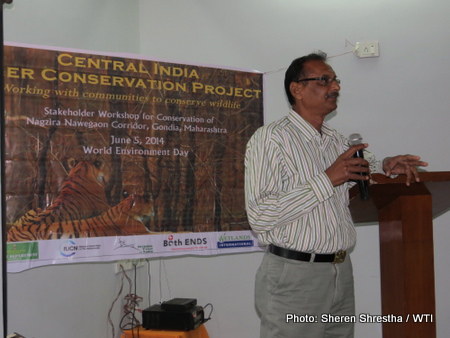Gondia (Maharashtra), June 5, 2014: A wide range of stakeholders came together this World Environment Day to facilitate collaborative and coordinated interventions to secure the critical Nagzira-Nawegaon corridor in Gondia district of the central Indian state of Maharashtra.
The half-day workshop was organised by the Wildlife Trust of India (WTI)’s Central India Tiger Conservation Project that has been working to conserve the corridor, supported by Ecosystems Alliance as well as the Japan Tiger and Elephant Fund. The workshop was chaired by Shri Ramarao, Deputy Conservator of Forests, Gondia Forest Division.

“Strategically located in the central Indian tiger landscape that harbours around 6 % of the world’s wild tiger population, Nagzira-Nawegaon corridor connects Pench, Kanha and Tadoba Tiger Reserves and is a crucial link in the entire landscape. The corridor plays an important role in the dispersal of tigers within the landscape, and harbours good density of prey population,” said Prafulla Bhamburkar, WTI Senior Advisor.
Over 90 villages are dependent on the corridor for various resources including firewood, grazing and NTFPs, imposing immense pressure on the resources of this critical connectivity.
“There are numerous government and non-government agencies working in this corridor. However, not all are aware of the global significance of this corridor and are independently implementing schemes that benefit wildlife and people here. These interventions will be more impactful if the agencies collaborate and coordinate their actions so that the effort is not duplicated or contradicted by one another,” said Anil Kumar Nair, WTI’s Central India Tiger Conservation Project Lead.
The workshop began with an introduction by WTI’s Regional Head for Central India, Dr Rajendra Prasad Mishra, who highlighted the corridor, its significance, and the threats to it. The team also apprised the stakeholders on the initiatives undertaken by them including policy advocacy to protect the forests and the corridor, capacity building of frontline staff as well as work with the communities in several of the corridor dependent villages to reduce their dependence on the forests.

Dilip Gujjar, Consultant, State Biodiversity Board gave a talk on significance of creating the Biodiversity Monitoring Committees and their functioning. A discussion on the people’s biodiversity registers was carried out.
On this occasion, Mr Ramarao and Mr Padwe released the pamphlet prepared by WTI on ‘Sustainable Harvesting Practices’ to be distributed in corridor villages.
Thanking all the participants for attending the workshop, Dr R P Mishra said, “Conservation cannot be role of one organisation or another or one group or another. It has to be a collaboration of all stakeholders and that is why we have brought all of our esteemed guests here. Our priority is to save tigers and other wildlife, and at the same time, to ensure that people of the region continue to prosper as both of these are interlinked. With our joint efforts, we will be able to ensure that this happens.”